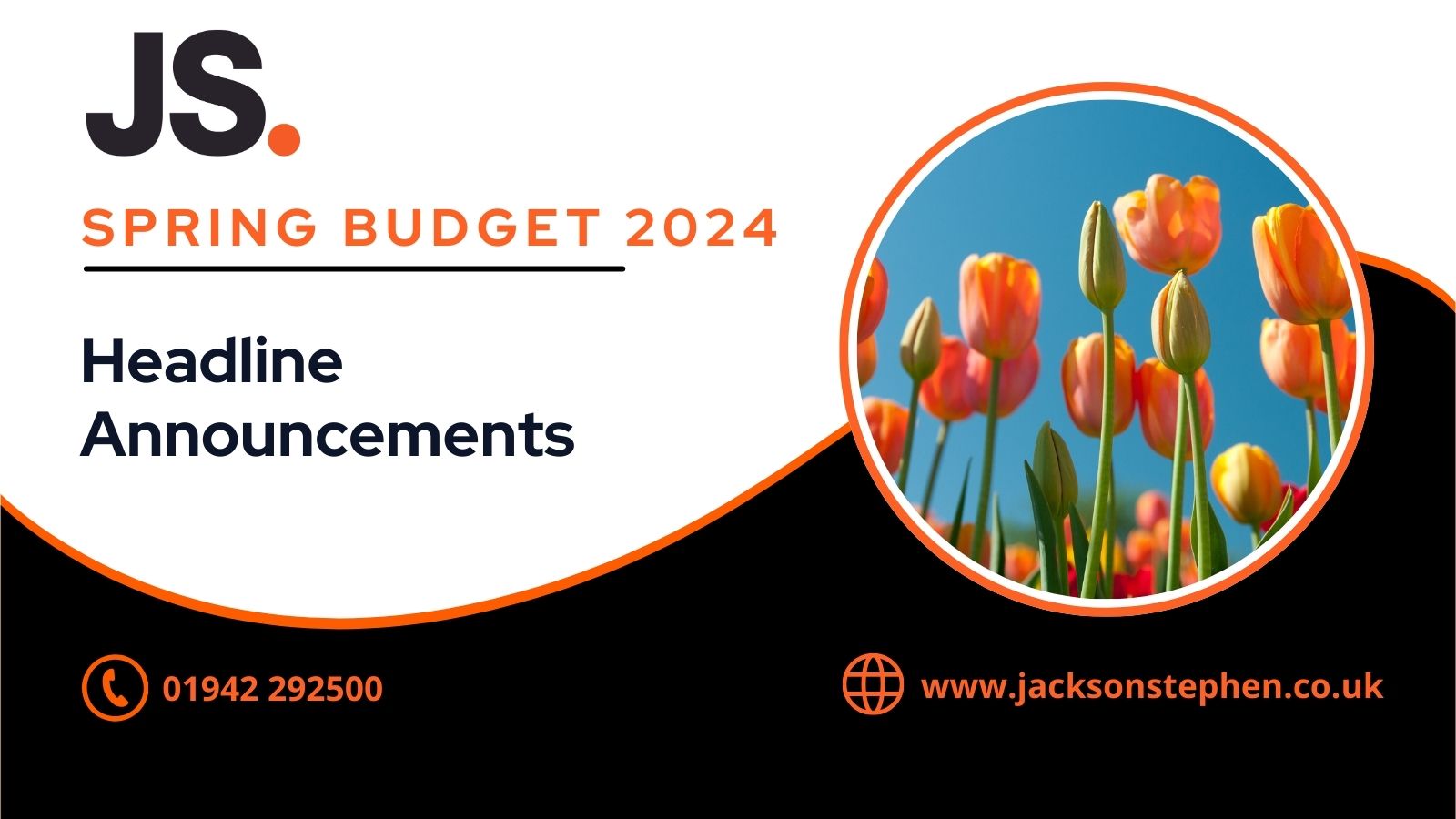
Spring Budget 2024 - Headline Announcements
06 Mar, 20242 minutesSpring Budget 2024 - A Budget for Long-Term Growth Jeremy Hunt delivered the Sprin...

Spring Budget 2024 - A Budget for Long-Term Growth
Jeremy Hunt delivered the Spring Budget, designed to “boost growth and put money back into the pockets of working families”.
Under his plans growth in living standards measured by real household disposal income is expected to be 0.8% this year and borrowing is expected to reduce to 94% of GDP which means the government is on track to meet both its debt and borrowing fiscal rules. Jeremy Hunt also announced that according to the OBR forecasts inflation will fall to 2% in 2 months’ time, explaining the Conservatives are successfully tackling inflation. This tackles three of the Prime Minister's priorities announced in 2023, to reduce inflation, grow the economy and reduce debt.
National Insurance – Keeping taxes low matters to the Conservatives
The Chancellor explained the tax system should be fair, simple, and reward hard work. At the moment, if you are of working age and get your income from having a job, you pay both National Insurance contributions (NICs) and income tax. If you get your income from other sources, you only pay income tax. Reducing employee and self-employed National Insurance is the best way to target working people, supporting growth and making the tax system fairer.
The government is cutting the main rate of employee National Insurance by 2p from 10% to 8% from 6 April 2024. Combined with the 2p cut announced at Autumn Statement 2023, this will save the average worker on £35,400 over £900 a year.
The government is also cutting a further 2p from the main rate of self-employed National Insurance on top of the 1p cut announced in the Autumn Statement 2023. This means that from 6 April 2024 the main rate of Class 4 NICs for the self-employed will now be reduced from 9% to 6%. Combined with the abolition of the requirement to pay Class 2, this will save an average self-employed person on £28,000 around £650 a year.
The combined effects of these reductions to National Insurance also means that a person on the average wage now has the lowest effective personal tax rate since 1975.
High Income Child Benefit Charge – Relaxed
The High-Income Child Benefit Charge is currently applied where an individual in the household earns more than £50,000 (tapered up to £60,000), regardless of the total household income. The government is committed to moving to a system based on household rather than individual incomes by April 2026 and will consult in due course.
From April 2024 the government will raise the threshold for the High-Income Child Benefit Charge to £60,000 taking 170,000 families out of paying this tax. The rate of the charge will also be halved so that Child Benefit is not repaid in full until you earn £80,000.
The government estimates that nearly half a million families will gain an average of £1,260 in 2024-25 as a result.
Stamp Duty Land Tax – Relief Abolished
Multiple dwellings relief offers stamp duty relief to buyers of multiple properties in one transaction. The relief was initially introduced to encourage investment in the private rental sector, but the Chancellor announced this did not have the intended outcome. For this reason, the Multiple Dwellings Stamp Duty Land Tax Relief will be abolished from 01st June 2024.
Capital Gains Tax – Rate Reduction
From 6 April 2024, the higher rate of Capital Gains Tax charged on gains realised on residential property disposals will be reduced from 28% to 24%. The lower rate will remain at 18% for gains that fall within an individual’s basic rate band.
Value Added Tax – Threshold Increased
The VAT registration threshold will increase from £85,000 to £90,000 on 1 April 2024 which is a welcome change for small business. At the same time, the deregistration threshold will increase from £83,000 to £88,000. The thresholds will be frozen at these levels.
Alcohol Duty - Frozen
The Government is extending the alcohol duty freeze, which was planned to end on 1 August 2024 to 1 February 2025. This results in 2p less duty on the average pint of beer for a further 6 months.
Fuel Duty – Relief Extension
The government is extending the temporary 5p fuel duty cut and cancelling the planned increase in duty for 2024-25. This represents around £13 billion of support over the three years from the cut being introduced and is worth around £50 for the average car driver in 2024-25.
Capital Allowances – Permanent Full Expensing
Full expensing will be made permanent and extended to assets for leasing when fiscal conditions allow. Draft legislation will be published in due course. It is not clear whether cars will remain excluded.
Non-Domiciled Individuals – Regime Replaced
The current Non-UK Domiciled tax rules will be replaced with a residence-based regime from 6 April 2025, key changes include:
- The current remittance basis of taxation for UK resident non-doms will be abolished
- Instead, new UK residents who have been non-UK resident for at least the previous 10 years will not pay tax on foreign income and gains for the first 4 years of UK residence
- The protection from taxation of income and gains of trusts for non-dom but UK resident settlors will also be removed
- Individuals previously using the remittance basis who do not qualify for the above 4 year exemption will for 2025/26 only pay tax on just 50% of their foreign income arising in that year (but this does not apply to foreign gains)
- Individuals previously using the remittance basis will also be able to access a temporary 12% reduced rate of tax when remitting pre-6 April 2025 foreign income and gains to the UK before 5 April 2027
- Subject to consultation, it is intended that Inheritance Tax (IHT) will also move to a residence-based system from 6 April 2025 with a person’s worldwide assets coming into charge after 10 years of UK residence and remaining within charge for 10 years after they leave. The treatment of assets held in trust is to be based on the status of the settlor at the time they were settled and the IHT status of existing trusts protected.
The removal of the protections from Income Tax and Capital Gains Tax (CGT) on trust income and gains for non-dom settlors is also a notable departure from long-standing UK tax practice in this area.
Furnished Holiday Lets – Regime Abolished
From 6 April 2025, the Furnished Holiday Let Regime will be abolished, eliminating the tax advantages previously afforded.
Income Tax – Extended ISA Allowance
There will be a new UK ISA to support savers, offering a £5,000 allowance in addition to the existing ISA allowance. This will be a new tax-free product for people to invest in UK-focused assets.
If you would like to discuss any of these matters or talk to us about your tax affairs in general, please contact our Tax Experts at js.tax@jsllp.co.uk.


